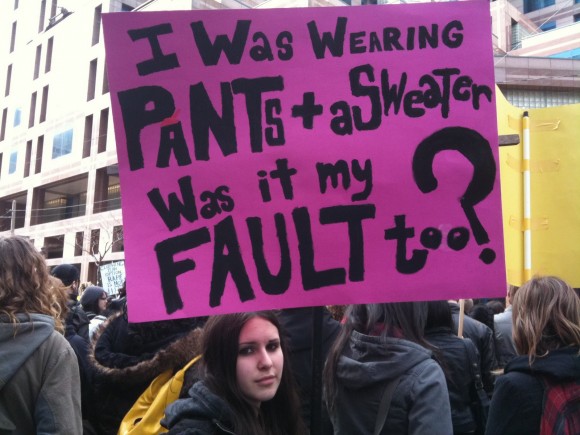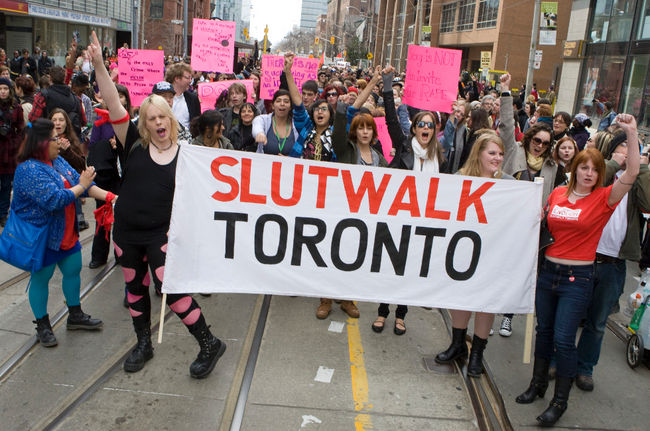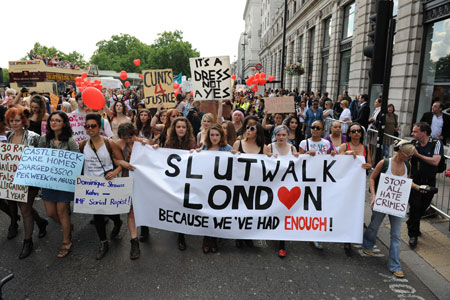This week we were fortunate enough to have the opportunity to speak with Colleen Westendorf, one of the organizers of SlutWalk. As most of us know, SlutWalk began in 2011 in response to the following comment from a Toronto Police Officer: “I’ve been told I’m not supposed to say this – however, women should avoid dressing like sluts in order not to be victimized.”
In just over a year SlutWalk has become a global phenomenon with women and men all around the world speaking up to say that those who experiene sexual assault are not the ones at fault, the perpetrators are! SlutWalk 2012 takes place tomorrow, Friday May 25th. Here is our interview with Colleen:
Nellie’s: People often say the current wave of feminism lacks a leader or a common cause. How has SlutWalk changed the landscape of Canadian feminism over the last year?
Colleen: Whatever shifts SlutWalk has been able to precipitate are very much indebted to previous feminists and activists, and other movements to fight sexual violence that came before us and are still going. I think it’s fair to say that SlutWalk has sparked a significant amount of debate and conversation about rape culture, use of language, privilege, and offered a supportive space for victims of sexual violence that wasn’t really there before.
Nellie’s: Why do you think the national and worldwide response to SlutWalk has been so huge?
Colleen: While there have been many initiatives, campaigns and individuals who have been fighting sexual violence, SlutWalk is the first endeavor (at least in my memory) to specifically focus on victim-blaming, and to have been a reactionary response to a a really clear incident of slut-shaming. Unfortunately, we kind of had a built-in audience. It would appear that victim-blaming is a really common factor in how survivors of sexual violence experience the aftermath. I would like to think that the major international response has gone some way to furthering the understanding that sexual violence is a lot more common that many people think, and should be everyone’s concern.
Nellie’s: How do you think Social Media contributed to the worldwide explosion of SlutWalk?
Colleen: Given the initial event was advertised online only 6 weeks from the beginning through Facebook and Twitter, social media definitely facilitated the quick spread of the first SlutWalk and the 4,000-strong audience that showed up last year. Within days of SlutWalk Toronto 2011, we were already hearing about other cities that wanted to hold their own – news would not have travelled this quickly through mainstream conduits, and the coverage and impression of the event – what is was, what people wore, was not nearly as accurate on network channels and big newspapers as what account people could find online from actual attendees at SWTO2011. That makes a huge difference.
Nellie’s: How do you respond to allegations that Slutwalk is a white woman’s movement and does not include women of colour?
Colleen: There’s no simple answer to this – it is a complex issue. We feel it’s incredibly important to recognize the ways that different communities and identities experience sexual violence, and are working on an ongoing basis to organize in a way that de-centers privilege , and increases our understanding of who we may be leaving out, and what we need to do to change that. We’re also doing a lot of community outreach and connecting with organizations in our city to solicit feedback and criticisms and base our organizing in our communities in Toronto. I think we’ll see more with regards to where some of these criticisms sit in the not-too-far future; now that SlutWalk has become so global and has had so much uptake in many places like India, Central and South America, Singapore, etc. the global context is a reminder that this isn’t just a North American thing anymore. We’ve also shifted our approach from re-appropriation to challenging language, hence our tagline this year: My Body is Not An Insult. (See event page for details.) Some of our speakers will be discussing these criticisms this year; and we’re really looking forward to further dialogue.
Nellie’s: Where do you see SlutWalk in a year, 5 years? Does SlutWalk have plans for the future?
Colleen: We are looking at what we can do to make this work sustainable. Victim-blaming is still a problem, and one that we would like to continue to play a part in chipping away at. This may include changing our name if it remains problematic and divisive, as many have said, and we definitely want to develop an advisory committee to help us with bigger decisions moving forward. I think our focus in the future will be less on a ‘walk’ and more on some of the things we’ve been getting up to in the last year, like speaking engagements, workshops, connecting at conferences, etc. Whatever we can do to further conversation and understanding that the victim of sexual violence is never at fault – we’re there.
Nellie’s: What has been your most memorable SlutWalk moment?






